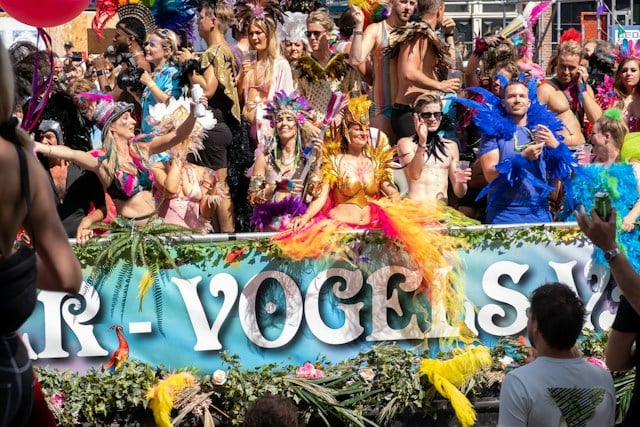Are you reading for Dutch Carnival? Here are some fun facts and handy vocabulary for this southern celebration in the Netherlands.
Apart from celebrations like King’s Day and Sinterklaas; the southern provinces of the Netherlands (Limburg and Brabant but also some parts of Drenthe) have something else going on: Carnival!
I have also gathered some fun facts and terminology to maximise the fun for you this year!
Fun Facts about Carnival in the Netherlands

- Dutch Carnival marks the start of the Christian fasting season of Lent. It’s celebrated on the sixth Sunday before Easter and ends on the Tuesday before Ash Wednesday.
- The first Carnival took place in Den Bosch around the late 14th and 15th centuries. It was primarily an adaptation of a pagan celebration.
- In Germanic folklore, the number 11 is known as the “fool’s number”, and it holds a significant role in the celebrations as well.
- The costumes are important! Dutchies put a lot of effort and care into them. They are called pekskes in the local dialect.
- The music band is called Zate Hermeniekes (literal translation: tipsy brass bands). They can be found on every corner to entertain the entire city with their music.
- A protocol committee selects the Carnival Prince in secret every year
Dutch Carnival terminology
During this time, whether you know how to speak Dutch or not, you might realise that everyone is using a rather strange language around you.
READ MORE | In need of a giggle? This American comedian perfectly explains the hilarity of learning Dutch
Don’t panic. It’s all because of the Carnival. With our small dictionary, you won’t only be able to understand what they are saying, but you can join the fun as well!
1. Alaaf
You can use this word for greetings and everything else. In doubt, just shout ‘Alaaf‘!
It’s traditionally accompanied by a crooked salute in which you bring the fingers of your right hand up to your left temple.
2. Boerenbruiloft
This is a mock ceremony of a bride and groom who carry the love for Carnival.
As we’ve mentioned before, Carnival is all about reverse roles. So, here the bride and groom both dress as farmers regardless of their status.
3. Carnavalskraker
This is a special song made especially for this occasion.
The best way to enjoy it is by shouting with the rest of the group while downing your 11th drink. Don’t forget to dance polonaise (explained below) while you are at it!
4. Dweilorkest
This is the name of the orchestra that plays music around the city.
The word dweilen is literally translated as “to mop”, but in this situation, it means “to amble”. It comes from partygoers ambling from bar to bar. Suitable!
5. Hossen
This means dancing. Preferably, a lot of it!
6. Polonaise
This is a dance where people hold onto each other’s shoulders.
They form a line and parade around to party music. Even though it also can be described as a Polish dance, this version is quite different. You gotta see it to believe it!
7. Prins Carnaval
Prince Carnaval is an elected city ruler by a city’s Carnival society.
He goes as far as receiving the key to the city during the celebrations. Therefore for the upcoming 3 three days, the Carnival Prince has control of the city and their Kingdom of Fools.
READ MORE | Celebrating Carnival in the Netherlands: your ultimate guide
8. Sleuteloverdracht
This is the symbolic gesture of handing the city’s key by the mayor to Prins Carnaval on the first day. In some cities, this is done precisely at 11:11 am.
9. Vastelaovend
This word is also known as Fat Tuesday. This is the Tuesday before Ash Wednesday and the last night of the Carnaval.
That’s it from us! Do you have any other words you can add to the list? Don’t forget to let us know in the comments!

Ouch. The auther obviously googled the infornation. There’s a massive difference between rhinelandish and burgundian carnival, and it’s different in every city in brabant. Saying Alaaf in Brabant is an incredible faux-pas. Vastelaovond is Limburgish. Please rewrite this article or let someone who knows how it works do it.
Yes totally agree!
[…] after Christmas, and some imported Holidays like Valentine’s day and of course carnival in the South, Easter starts being advertised. With its promise of bunnies, light, and a renewal of […]
The writer has not really got all the facts right sadly. A bit more research would have clarified that.